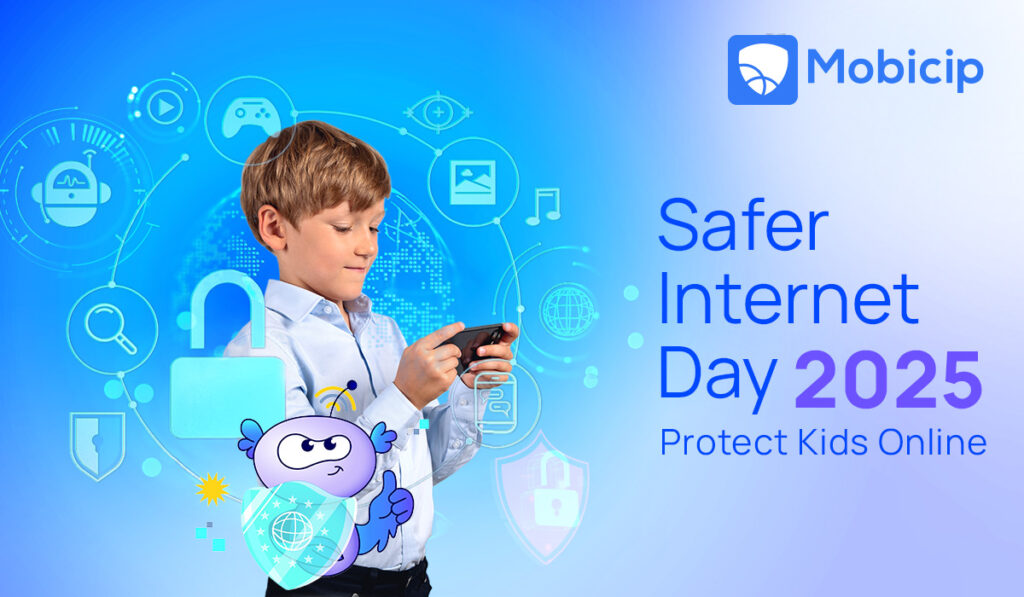Safer Internet Day 2025: Protect Your Kids Online

Safer Internet Day (SID) 2025 is a global initiative observed on February 11, aiming to promote a safer and more responsible online environment for children and young users. With the rise of digital threats, from inappropriate content to online scams, it’s more crucial than ever for parents to take proactive measures to protect their kids.
One of the leading solutions helping families navigate online safety is Mobicip. With its parental control tools, screen time management, and content filtering capabilities, Mobicip empowers families to create a balanced and secure digital environment for children. According to Mobicip’s internal data, children using the platform demonstrate healthier digital habits compared to national averages, spending less time on social media, gaming, and entertainment apps, and prioritizing real-world activities.
Understanding the Digital Landscape
The internet has evolved into an essential part of daily life, shaping how children learn, socialize, and entertain themselves. However, this digital expansion also brings numerous risks:
- Inappropriate Content – Easily accessible harmful material.
- Social Engineering and Scams – Manipulative tactics targeting children.
- Misinformation and Fake News – Misleading information shaping young minds.
- Online Extortion and Blackmail – Threats coercing kids into unwanted actions.
- Loss of Control Over Shared Content – Permanent digital footprints.
- Grooming and Predatory Behavior – Exploitative adults seeking to manipulate children.
To combat these threats, digital literacy is essential. Teaching children how to recognize risks and behave responsibly online is the first step toward a safer digital future.
The Impact of Inappropriate Content on Children
Exposure to harmful content can have serious psychological effects, including anxiety, fear, and desensitization. Parents can take action by:
- Using Parental Controls – Restricting access to age-inappropriate content with tools like Mobicip.
- Encouraging Open Discussions – Making children feel comfortable sharing their online experiences.
- Teaching Safe Browsing Habits – Guiding kids to recognize unsafe links and websites.
Social Engineering and Scams
Children are prime targets for online scams due to their trust and curiosity. Common scams include:
- Phishing Attacks – Fake emails or messages tricking kids into revealing information.
- Online Giveaways & Prizes – Fraudulent schemes luring children into sharing personal details.
How to Protect Kids:
- Educate them about not sharing personal information.
- Set strict privacy settings on devices and accounts.
- Teach them to verify sources before clicking on links or downloading apps.
Misinformation and Fake News
With social media acting as a primary news source for children, the spread of misinformation is a major concern. According to a 2024 report, two-thirds of children have encountered online harms, including fake news.
Steps to Combat Misinformation:
- Teach children critical thinking skills to analyze online content.
- Encourage them to fact-check using reputable sources.
- Promote open discussions about current events and internet trends.
Online Extortion and Blackmail
Online predators use extortion tactics to manipulate children. To prevent this:
- Encourage open communication with kids about their online interactions.
- Teach them to never share sensitive content.
- Report threats to the platforms and relevant authorities.
Loss of Control Over Shared Content
Once something is shared online, it’s nearly impossible to erase. To manage online privacy:
- Teach kids to think before they post.
- Review and update privacy settings regularly.
- Explain the long-term impact of their digital footprint.
Grooming and Predatory Behavior
Online grooming is when predators build trust with a child for exploitation. Warning signs include:
- Excessive secrecy about online activities.
- Sudden mood changes.
- Receiving gifts from unknown sources.
How Parents Can Help:
- Monitor their online interactions and friendships.
- Set clear internet usage boundaries.
- Educate them about red flags and safe reporting.
The Role of Parents and Guardians
Parental involvement is key in ensuring children’s online safety. Here’s how:
- Regularly discuss online experiences with kids.
- Stay informed about trending apps and platforms.
- Utilize monitoring tools like Mobicip, which offers content filtering, screen time limits, and activity reports.
How Mobicip Supports Digital Well-Being
Mobicip’s data shows that kids using the platform have healthier digital habits:
- Screen Time Management – Mobicip kids receive over 250,000 screen time alerts monthly, encouraging balanced usage.
- Social Media Use – While the national average for kids is 3 to 3.5 hours daily, Mobicip users spend less than 1 hour, fostering mindful online interactions.
- Gaming Habits – Instead of the typical 2 hours per day, Mobicip kids average 45 minutes, promoting healthy gameplay limits.
- Entertainment Consumption – Nationally, kids watch 1.5 hours daily on streaming platforms, whereas Mobicip users balance it to 45 minutes to 1 hour, ensuring a mix of learning and leisure.
According to Suren Ramasubbu, CEO of Mobicip, “As technology continues to shape children’s lives, it’s crucial to provide tools that help them navigate the digital world safely. This Safer Internet Day, we are proud to empower families with solutions that encourage responsible screen time, mindful social media use, and a balanced digital lifestyle.”
Educational Resources and Tools
To further enhance online safety, explore:
- ConnectSafely – Safety tips and digital parenting guides.
- Common Sense Media – Reviews and advice on age-appropriate content.
- Mobicip – A trusted parental control solution that promotes healthy digital habits.
Conclusion
This Safer Internet Day 2025, parents are encouraged to take proactive steps in protecting their children’s digital lives. By using effective parental controls, fostering open communication, and teaching digital literacy, families can ensure a safer and more balanced online experience for children.





